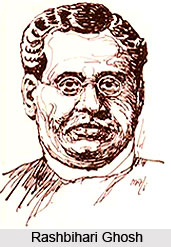Rashbihari Ghosh was an important and towering personality in the history of Indian Independence and his name is written in water mark in the history of Indian Independence.
Early Life of Rashbihari Ghosh
Rashbihari Ghosh was born on 23 December 1845 in Burdwan, West Bengal. His first educational short spell was at the local pathshala and later Rashbihari was educated in the Burdwan Raj Collegiate School. Passing the entrance examination from Bankura, he placed himself at Presidency College, Calcutta and a genius he was the proud possessor of the position of a meritorious student as he obtained a first class in the M.A. examination in English. In 1871 he passed with honours the Law examination and in 1884 was awarded the degree of Doctor of Laws.
 Career of Rashbihari Ghosh
Career of Rashbihari Ghosh
Ghosh was closely associated with Calcutta University. From 1887 to 1899 he was a member of the Syndicate. Gokhale`s scheme of compulsory primary education received his balmy and cordial support and during the Swadeshi Movement he supported the move for national education, becoming the first President of the National Council of Education (1906 - 21).
He hardly associated himself publicly with the Indian National Congress until 1906. However Indian politics was waiting for him and his first important appearance in politics was in 1905 which is remarkable in history for the Partition of Bengal when he presided over a meeting held in the Calcutta Town Hall to protest against the offensive remarks of Lord Curzon at the Convocation ceremony of University of Calcutta.
In 1906 he was the Chairman of the Reception Committee when the Congress held its annual session in Calcutta. Next year he presided over the Surat session which ended in pandemonium. In 1908 he presided over the Madras session. A moderate in politics, he took a prominent part in the Swadeshi movement which he considered to be based on "love of our own country, not on hatred of the foreigner". To him it meant "the development of India for Indians". This object he wanted to achieve through constitutional agitation and denounced the extremists as "impatient idealists". The national movements of other countries also interested him. He was greatly influenced by Gopal Krishna Gokhale`s political ideas. He looked upon the British rule in India as a blessing and had great faith in Britain. "I can never think," he observed, "that England will ever retrace her steps or forget her duty to India.
A stout defender of the economic, interests of India, he looked upon the Swadeshi movement as a means of fostering indigenous industries which the British Government, following free trade principles, had failed to protect by tariff. He himself financed one `Bandemataram Match Factory`. He thought that the Government of India should be the "motive force in the industrial development of the country".
Although not a habitual public speaker, he was an accomplished orator. He addressed the annual sessions of the Indian National Congress and also spoke on other important occasions.






